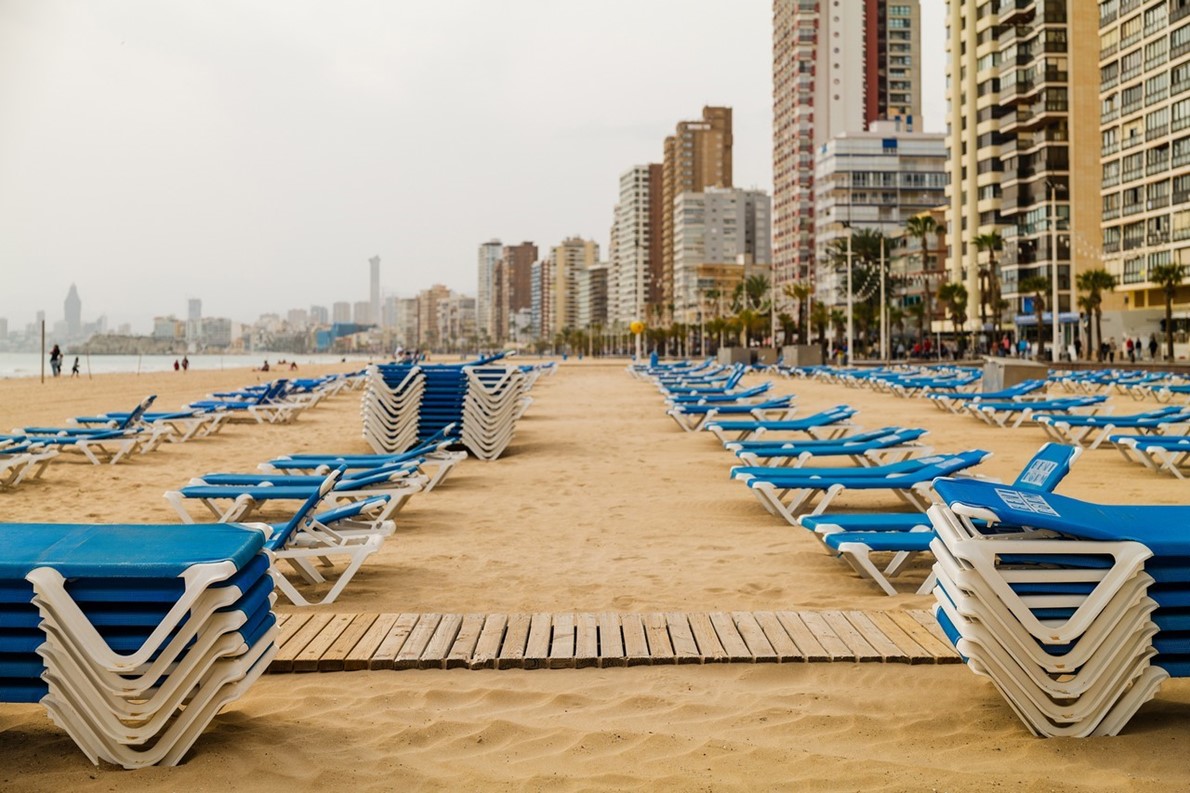Diego Sanz, a tour guide on
Spain’s
southeastern Mediterranean coast, received his first international group
booking in more than a year in mid-February. It was, he thought, an augury of
better things to come.
اضافة اعلان
“Here we live in paradise, and we were sure that
when
COVID restrictions were lifted, we would not have any more problems and
tourists would come back to us like the honeybees come to the nectar,” said
Sanz, sitting in a quiet cafe in late March in the port city of Alicante.
Then Russia invaded
Ukraine and brought new
international bookings to a grinding halt. In the first week of the war alone,
airline bookings within Europe fell by 23 percent and trans-Atlantic bookings
to
European countries fell by 13 percent, according to the travel data company
ForwardKeys.
“We are in the middle of a big storm,” said Sanz,
speaking both literally and figuratively. Outside the window of the cafe, the
Costa Blanca region was enduring one of the heaviest rainstorms in its history,
with 18 consecutive days of heavy downpour that caused flash flooding and
washed-out roads.
“The sun will come back, but what will happen with
the war and the economic problems?” he continued. “I don’t know if we will be
able to make any profit this summer.”
Many of the European countries including Spain,
Greece, Italy, and Croatia that are heavily dependent on tourism had hoped to
start the travel season early to make up for lost revenue from the pandemic.
That is now looking unlikely. So far, the worst-hit destinations are those in
proximity to Ukraine, including Poland,
Bulgaria, Croatia, Estonia, and
Hungary, which saw a decrease in bookings between 30 percent to 50 percent,
according to Forward Keys. Many travel operators in those countries are swept up
in efforts to help refugees fleeing Russian forces, unable to contemplate what
impact the war might have on their livelihoods.
 Toni Mayor, president of the HOSBEC, the Costa Blanca hotel association, in Benidorm, Spain, March 28, 2022.
Toni Mayor, president of the HOSBEC, the Costa Blanca hotel association, in Benidorm, Spain, March 28, 2022.
Across the continent, damage is already being felt
with rising fuel costs, supply chain issues, inflation, and labor strikes.
Energy prices in Italy have surged in recent months, worrying hotel operators.
Truck drivers in Spain have been on strike for more than 10 days, causing
sporadic food and goods shortages. Hotels and
restaurants are scrambling to
find affordable replacements for key supplies like wheat and sunflower seed
oil, of which 75 percent to 80 percent of the world’s supply comes from Russian
and Ukraine, according to the
UN World Food Program.
“We are trying to be flexible and find replacements
for products in short supply, like we use olive oil instead of sunflower oil,
so it does not impact the customer experience,” said Javier Garcia Cuenca, the vice
president of
Magic Costa Blanca Hotels and Resorts. “But the problem is
managing cost, it becomes more expensive.”
Croatia often ranks among Europe’s most
tourism-dependent economies, with tourism accounting for about one-fifth of the
small nation’s gross domestic product, according to the
Croatian Bureau of Statistics. The country’s main attraction, its slice of the Adriatic coast,
drew most of the 13.8 million visitors and 84.1 million overnight stays to
Croatia in 2021. It drove a 10.4 percent growth in GDP year-over-year according
to the Bureau of Statistics.
Although
cancellations have been minimal in Croatia so far this year, the country is
also experiencing a slowdown in bookings.
Dubrovnik Boats, a
private excursion and charter company with a vast majority of clients from the
United States, was expecting a record year before the war. But then the rate of
bookings suddenly fell by 70 percent.
“To a foreigner, we’re one centimeter away from
Ukraine on a map,” said Niksa Smojver, the owner.
A significant
concern this year for marine charter companies is rising gas prices and the
potential for fuel shortages. For
Dubrovnik Boats, operating a round trip
between the hot spots of Dubrovnik and Hvar now costs around $750 more than it
did last year. So far, the company has not passed the increase to passenger
fares, but may have to.
Still, Smojver
remains hopeful. “After corona, people are fed up and everyone wants to travel.
This season could be one of the better ones we’ve had. Not a record, but
strong,” he said.
In other parts of
Europe, particularly in countries dependent on tourism, the outlook was
bleaker. Cancellations in Italy dampened an increasingly optimistic attitude
among tour guides and operators, even as some expressed hope that the war would
end and salvage the season.
“The mood in
general is depressive, because everything seemed to be over and instead there’s
been a new downturn,” said Margherita Capponi, a tour guide based in
Rome.
 Beach chairs await beachgoers at the seaside resort of Benidorm, Spain, March 28, 2022. (Photos: NYTimes)
Beach chairs await beachgoers at the seaside resort of Benidorm, Spain, March 28, 2022. (Photos: NYTimes)
Bernabò Bocca, the president of the Italian hotel
association Federalberghi, said he was most concerned over energy costs, which
have surged in Italy in recent months. “Hotels are energy-intensive companies,
they’re open seven days a week, 24 hours a day,” he said. “The cost of energy
has become a very important component, a price the entire world is paying.”
Before the
pandemic, tourism accounted for about 14 percent of
Italy’s GDP, according to
the country’s tourism ministry, and Italy’s national tourism agency, ENIT, said
that in 2019 more than 63 million foreigners traveled to Italy.
At a recent trade
show, Italy’s tourism minister,
Massimo Garavaglia, cited a February poll of
American travel sentiment by the market research firm MMGY Global, which
reported that 47 percent of the 4,500 surveyed were waiting to see how the
situation in Ukraine evolves before they make plans to visit Europe. “It’s
clear that if half of Americans don’t come to Europe, it’s going to be a
drama,” he said.
However, other
travel operators both large and small still express optimism for the upcoming
season, despite concerns over the war and the coronavirus. Last week, the
online travel agency Expedia announced a forecast for a strong summer in
Europe, saying search interest among US travelers looking to travel to Britain,
Germany, and France this summer increased fivefold compared to the same period
in 2020.
On Costa Blanca,
members of the local hotel industry have signed fixed-price contracts with tour
operators, which are likely to result in fewer cancellations. The main
challenge for hotels will be managing rising costs and adapting to supply chain
problems.
Cuenca, of Magic
Costa Blanca, said he had not yet increased rates and fees at his hotels and
expressed cautious optimism about the summer, after already booking about half
of his hotel rooms for the season. “We will have to watch inflation and may
have to adjust our rates to keep our profit margins,” he said.
Last year the
hotel chain had a successful summer season by attracting the domestic Spanish
market, but Cuenca was unable to open one of his hotels because of little
demand from the international market, particularly from British tourists who
faced stringent, unpredictable travel rules at home.
“We will not have
as strong a year as we expected,” he said. “But there is still strong demand as
people realized during
COVID that they could die and they will not live forever
so they prioritize holidays and leisure.”
Sitting in the
lobby of the
Port Benidorm Hotel last week, Toni Mayor, president of the
HOSBEC, the Costa Blanca hotel association, said the 89 percent hotel
occupancy, mainly of British tourists, was very encouraging. “They are coming
back,” he said.
Wendy Hartfield, a
history tutor from Yorkshire,
England, arrived in Benidorm last week hoping to
get some sunshine and play golf, but instead spent most of her vacation reading
indoors because of the rainstorms.
“I want to come back in
the summer, but with the way everything is going it might be too expensive,”
Hartfield said. “First we have to pay the bills at home.”
Read more Travel
Jordan News



